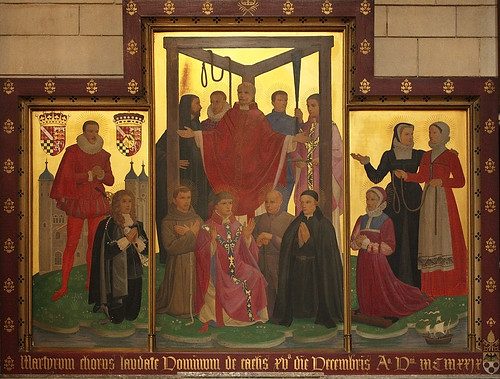There is a continuation of the unveiling of the mystery of who Christ is as Matthew’s Gospel shapes our celebration for the Feast of the Holy Family. His symbol is that of a winged man—indicating Matthew’s interest in providing us with a theological insight into the Man named Jesus. For Matthew, the Christ is to be the new Moses and in the circumstances surrounding the Flight into Egypt and His return, you catch many parallelisms between the lives of Moses and Jesus.
First, Moses was rescued from the wicked Pharoah and Jesus from Herod’s blood-thirsty sword. Pharoah’s massacre of the Hebrew first-born is re-enacted in Herod’s murder of the Holy Innocents. In the Exodus, Moses led the people out and now, the return from Egypt signalled the rise of the New Moses: Jesus Christ. Later parallelism will include His forty days in the wilderness as mirroring the Israelites wandering forty years in the desert.
What appears to be a straightforward account of a family’s harrowing refugee experience is actually a theological disclosure of Christ’s true identiy. This is Matthew telling his Jewish readers not to make any mistake about Jesus Christ. The Gospel ends with the return of the exiled family to Nazareth, a village whose name rhymes with being set apart. This new Moses, the one set apart, is the Holy One, the Son of God who has come to save His people.
What has this hifalutin theological unveiling do with us all?
It may be “high” theology but it is certainly earth-bound. From Christmas Vigil till yesterday’s Dawn Mass, we heard all there was to hear of their unfortunate circumstances. And this is where the Holy Family’s life intersect with ours. They may be the Holy Family and certainly they may have the Son of God in the family, what is clear is that they did not have it easy.
Perhaps it is better to say that they never had the entitlement attitude. What does it mean that one has an entitlement attitude? It is like, “I am of this skin colour therefore I am entitled to scholarship, to buy houses at a discount or to take loans that I do not need to repay etc” or if you do not have the correct skin colour, “I am of this rank, therefore I am entitled to better service etc”… For many of us with means, it is easy to slip into entitling this or that.
But, if you protest that you are not like that, then perhaps this might make sense. I pray, therefore I am entitled to God hearing my prayers. I try to be good, I lead a good life, I try not to sin, therefore I am entitled to a trouble-free life. Better still, “I don’t deserve this”. And this has been my experience. There are times when I get really not nice parishioners and during those times I would complain, “I am already working so hard, I am stressed out and I am serving God, I don’t deserve this”. The truth is, I am not special!! As someone would day, “Don’t flatter yourself”.
So, let us enter into a “perhaps” consideration. You see, we have this wonderful myth which associates the Son of God with cleverness or intelligence etc. The 12-year old in the Temple having a discussion with teachers surely lends us this idea that this was a clever child and after the incident of being lost and found in the temple, the Gospel of Luke also tells us that the boy grew in wisdom, stature and knowledge. A smooth transition, you would say.
But, many clever children are often hyperactive and close to unmanageable. In those days they called it precocious. Today we term it as ADHD [attention deficit, hyperactivitiy disorder]. And so, on top of having to undergo the arduous journey for a census taking, heavily pregnant and giving birth in a stable and then fleeing down to Egypt and most probably staying in the poorer part of the immigrant’s shanty, both Joseph and Mary may also be dealing with this super child or “special child” whose categories are not always normal. Some of us who feel it really bad that life has not given us any break should turn to Joseph and Mary because this “perhaps” consideration does bring them closer to earth, to where we are.
It is a funny thing that we seek sympathy but we seem to shy away from what we have. For example, clever priests have often asked what significance the Holy Family has for us today: Mary was virgin, Joseph was a celibate and the boy was divine. What do they know of life’s struggles? Well, surely, they know our sufferings and feel our sorrows. Both Mary and Joseph may be descended from royal lineage and with the Son of God on their side, one would naturally expect some slack cut but God has not spared them. Furthermore, as mentioned earlier about “I do not deserve it” attitude, well, there is no assurance that the good will not suffer. In fact, the “goodest” of us all, if there is such a word, the Son of God suffered grieviously at hands of wicked men. God did not think to spare the most exalted one: His Son.
So, if you think that God is absent because your life “sucks” or it seems to be this never-ending ride of misfortunes, then perhaps a relook at the Holy Family might disabuse you of this notion. God is even closer when you feel His absence. They are called “holy” not because they are better than us; certainly not because they are one class higher than us. They are holy because they never allowed any misfortune to come between them and their faith in God.
FOOTNOTE:
[1] There are four Masses for Christmas Eve and Christmas Day. 1st Mass—Christmas Vigil, we get acquainted with the human origin of Christ. 2nd Mass—Christmas Midnight, we experience the circumstances surrounding the birth of Christ. 3rd Mass—Mass at Dawn can be said to be a sort of Epiphany because of the visit by the Magi and finally, 4th Mass—Mass of the Day which takes us into the Divine origin of Christ.




